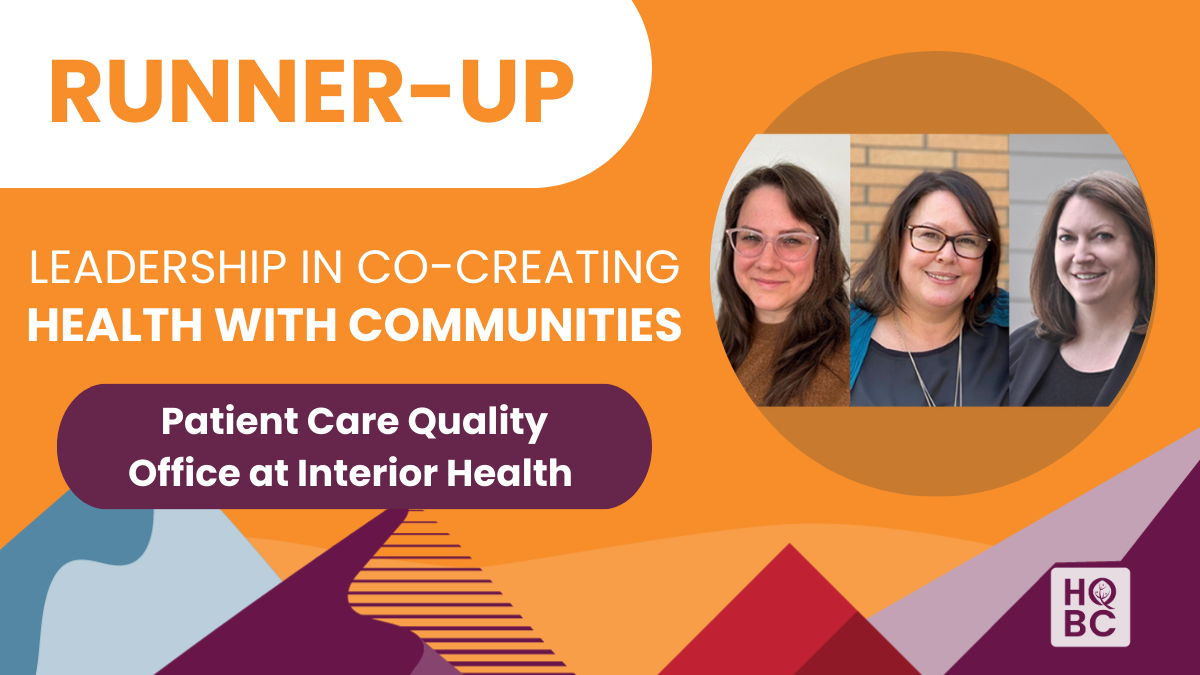- 2024
|
- Runner-Up
|
- Leadership in Co-Creating Health with Communities
In November 2020, the In Plain Sight Report revealed that the complaints processes in the BC health care system did not work for Indigenous Peoples. They were not accessible, did not provide for integration of Indigenous cultural processes, generated fear of repercussions, could be re-traumatizing, and there was little trust that the complaint would be addressed in a meaningful way.
In BC, the Patient Care Quality Review Board Act mandates that each health authority must establish a patient care quality office (PCQO) to receive care quality complaints. The PCQO acknowledges the complaints, conducts a review, and responds to the client within a legislated time.
The In Plain Sight Report also recommended improving the cultural safety and accessibility of complaint processes such as PCQO to address individual and systemic Indigenous-specific racism.
At Interior Health (IH), work was already underway to address the recommendations from the In Plain Sight Report. The Ministry of Health and the First Nations Health Authority (FNHA) were working together as part of the provincial Cultural Safety Project Collaborative to improve the cultural safety of the Patient Care Quality program. All health authorities were participating in the Collaborative, along with provincial quality and safety organizations and First Nations and Métis partners.
Following engagement and approval by First Nations and Métis leaders through the Partnership Accord Leadership Table and Métis Interior Leadership Table, Shari McKeown, IH’s Director of Patient Care Quality, Safety & Accreditation, her team, and with support from IH Indigenous Partnerships, led the implementation of Indigenous self-identification within the PCQO.
As part of the process to embed Indigenous self-identification in the PCQO process, data fields were developed in alignment with the Aboriginal Administrative Data Standard. The collection of this data supports the opportunity for IH and Indigenous health organizations and communities to collaboratively work together to improve the health status of Indigenous Peoples living within the region.
The team recognized that cultural safety within the PCQO process needed to be defined by the client and community. The team also recognized that many Indigenous Peoples within the Interior Region had a deep and sometimes generational mistrust of the health care system. Rather than design a process for Indigenous Peoples, they realized the PCQO process needed to be designed with Indigenous Peoples. Changes that were needed in the program were to be based on a foundation of trust, and building trust would only be possible through the building of strong relationships and collaboration.
In January 2021, two Indigenous Patient Care Quality & Safety Consultants were hired as part of the IH PCQO. With support from the IH Indigenous Partnerships team and the FNHA, the Indigenous consultants began ongoing engagement with the Dãkelh Dené, Ktunaxa, Nlaka’pamux, Secwépemc, St’át’imc, Syilx, and Tŝilhqot’in Nations in the Interior region. Additional engagement with urban/away-from-home Indigenous Peoples as well as Métis communities is ongoing.
The purpose of the engagement was and is to build awareness of the PCQO and to invite collaboration and input into the design of the IH Indigenous PCQO process so that the process is co-created with Indigenous Peoples. It is through the co-design process that the program evolved to include a restorative approach to healing from harm.
Restorative approaches are in keeping with time-honoured Indigenous cultural traditions and use relationship-focused processes to restore trust between individuals who cause harm and those who are harmed. This is accomplished through relational practices that may include circle meetings or community conferences, which make space for spiritual and ceremonial practices and promote individual and collective responsibility. These restorative approaches are client-led and specific to the distinct needs and preferences of the client, family, and local community or Nation.
“The work with our Indigenous partners to integrate the principles of a restorative approach in the Indigenous Patient Care Quality program has given us new insights into the quality and safety of our care,” says Glenn McRae, IH’s Vice President of Quality, Research and Academic Affairs. “The approach positions us to view feedback as a gift and guides us in how we come together to address the opportunities for improvement that follow.”
The percentage of clients identifying as Indigenous in the PCQO has increased from 6.4% in 2020-2021 to 9.6% in 2022-2023. This exceeds the proportion of population in the Interior with Indigenous identity (9.1%) and represents increasing awareness of the program and/or increasing perception of cultural safety in the process.
In August 2023, an external consultant specializing in Indigenous evaluation was engaged to commission a formal evaluation framework for the IH Indigenous PCQO program. The evaluation framework will guide the integration of metrics to support the ongoing assessment of client experience within the program.
Says the IH Indigenous Partnerships Leadership Team, “The Indigenous Patient Care Quality Program at IH has been working in collaboration with Indigenous health leaders, communities and organizations to establish culturally safe processes where clients and their families feel comfortable to share feedback on IH programs and services. This is an important part of the work required to address Indigenous-specific racism and discrimination in health care and improve health and wellness outcomes for Indigenous peoples in the Interior region.”


